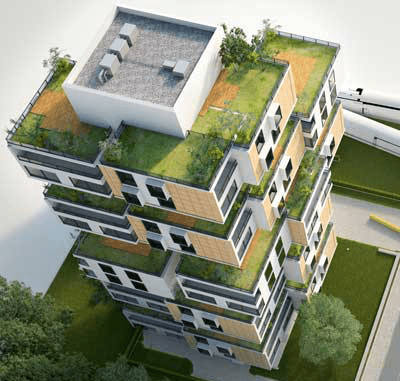Sreejith Jayaram
Indian Institute for Human Settlements (IIHS), Bengaluru, India Corresponding Author sjayaram@iihs.ac.in
Deepa Parekh
Environmental Design Solutions (EDS) Pvt. Ltd., Mumbai, India
Prasad Vaidya
Indian Institute for Human Settlements (IIHS), Bengaluru, India
Yashima Jain
Indian Institute for Human Settlements (IIHS), Bengaluru, India
Jaydeep Bhadra
Loughborough University, Loughborough, UK
Cite this article
Highlights
- The primary objective of the paper is to evaluate the current state of education curricula to build capacity in students to design net zero resilient buildings with the literature review of formal education curriculum, continuing education programs, and competitions aimed towards building capacity for designing climate resilient buildings.
- This paper finds that building sector education needs to be interdisciplinary with competencies and knowledge in three areas – Climate Literacy, Climate Justice, and Climate Action.
- This paper also finds that among the curricula and education programs reviewed, the ten contests of the Solar Decathlon India and the education resources provided in the challenge form a robust framework that could be used in education curricula in India.
Abstract
This paper evaluates the current model curricula in India for architecture and engineering colleges as well as education policy documents that will influence the coursework taught across the country to determine if the undergraduate and post-graduate education system is aimed at creating future professionals who can respond to India’s Nationally Determined Contributions and net-zero by 2070 goal. It uses literature review and survey data to identify gaps in graduate attributes and competencies that result from these curricula and policy documents. While over fifteen years of codes and rating systems, and longer for industry-led practices, have introduced standards and best practices, the market has not moved towards future-proof net-zero buildings. The findings show that the model curricula do not address climate change and that comprehensive frameworks, as well as transformative education at scale, are being done through other programs like Solar Decathlon India (SDI).
Keywords
Net Zero Buildings, Education, Curriculum, Climate Change, Evidence-Based Design
References
- “India’s Updated First Nationally Determined Contribution Under Paris Agreement.” United Nations Framework Convention on Climate Change, Aug. 2022. https://unfccc.int/sites/default/files/NDC/2022-08/India%20Updated%20First%20Nationally%20Determined%20Contrib.pdf
- RMI India. (2021). India’s Buildings Sector Moonshot: Corporate Climate Commitments Can Forge the Path. https://rmi.org/indias-buildings-sector-moonshot-corporate-climate-commitments-can-forge-the-path/
- T. Garg, and J. Bhadra, “Code to Label; Lessons Learned and the Case for India,” ACEEE 2020 Summer Study on Energy Efficiency in Buildings.
- J. Bhadra, Y. Jain, J. Venkatesh, and P. Vaidya, “Unscrewing the climate change lightbulb with 5,000 net-zero-energy professionals,” Eceee Summer Study Proceedings, 2021. https://www.eceee.org/library/conference_proceedings/eceee_Summer_Studies/2021/2-policy-innovations-to-ensure-scale-andsustain-action/unscrewing-the-climate-change-lightbulb-with-5000-net-zero-energy-professionals/
- S. Manu, P. Vaidya, R. Rawal, “Building bridges or chasms? Separating energy efficiency education for better integration,” PLEA 2017 Proceedings, 2017.
- S. Jayaram, A. Thounaojam, J. Venkatesh, S. Srivastava, G. Vakil, Y. Jain, “The Twelve Percent Effect Improvements in evidence-based design towards net-zero building performance,” IBPSA, Building Simulation and Optimisation, 4, 2022.
- All India Council For Technical Education (AICTE). (2018). Model Curriculum for Undergraduate degree courses in engineering & technology (Volume I).
- All India Council For Technical Education (AICTE). (2019). Model Curriculum for Bachelor of Architecture (B. Arch) 2019. https://www.aicte-india.org/flipbook/p&ap/B.arch/index.html
- Council of Architecture. (2020). The Gazette of India: Extraordinary (Part III) – Section 4 (COA Minimum Standards of Architectural Education Regulations 2020) (Vol. 2020, Issue D).
- Council of Architecture (Ed.). (2023). ARCHITECTURE EDUCATION Way ahead, in pursuit of Education Reforms . Retrieved from https://www.coa.gov.in/app/myauth/notification/COA%20Circular%20on%20Education%20Reforms%20-%2009.01.23.pdf
- P. Vaidya, “Personal Communication with Registrar, CoA.” India, Bengaluru, Mar. 2023
- V. Nalla, C. Johnson, N. Ranjit, G. Sen, A. Peddibhotla, M. C. Anand, N. Bhatia and A. B. Bazaz, “Considering curriculum, content, and delivery for adaptive pathways: higher education and disaster resilient infrastructure in the Indian urban context,” Sustain. Resil. Infras., vol. 8, pp. 143-156, 2023. https://doi.org/10.1080/23789689.2022.2134645
- S. Jayaram, “IBPSA, Building Simulation and Optimisation, 2022,” in Twelve Percent Effect: improvements in evidence-based design towards net-zero building performance, 2022
- Solar Decathlon India, “Solar Decathlon India Competition Guide 2020-2021,” 2023. [Online]. Available: https://solardecathlonindia.in/wp-content/uploads/2022/08/Solar-Decathlon-India_Competition-Guide_March26032021.pdf.

 Bishal Thapa
Bishal Thapa





 Fred Sherman
Fred Sherman Sumedha Malaviya
Sumedha Malaviya Satish Kumar
Satish Kumar












 The three main global energy concerns of providing access to modern energy, enhancing the security of the energy supply, and minimising the impact of energy systems on the climate have an impact on both national and international energy governance. To develop solutions that address the many facets of these difficulties, however, a variety of actors and stakeholders must be included due to the complexity of the energy challenges.
The three main global energy concerns of providing access to modern energy, enhancing the security of the energy supply, and minimising the impact of energy systems on the climate have an impact on both national and international energy governance. To develop solutions that address the many facets of these difficulties, however, a variety of actors and stakeholders must be included due to the complexity of the energy challenges. Cities are responsible for more than 70% of the world’s energy consumption and 40% to 50% of its greenhouse gas emissions. Managing increasing urbanisation is a challenge, and nations must deal with the effects it will have on the environment in terms of energy and climate.
Cities are responsible for more than 70% of the world’s energy consumption and 40% to 50% of its greenhouse gas emissions. Managing increasing urbanisation is a challenge, and nations must deal with the effects it will have on the environment in terms of energy and climate. Our transition to a future with lower carbon emissions depends heavily on buildings. They are our places of residence, rest, and employment; they also account for around one-third of the world’s greenhouse gas emissions and nearly 40% of the world’s energy usage.
Our transition to a future with lower carbon emissions depends heavily on buildings. They are our places of residence, rest, and employment; they also account for around one-third of the world’s greenhouse gas emissions and nearly 40% of the world’s energy usage.